ICRC stays put in Iraq
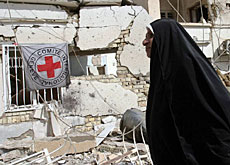
The International Committee of the Red Cross (ICRC) says it intends to remain in Iraq, despite Monday’s bombing of its headquarters in Baghdad.
But the Geneva-based organisation announced that it would be cutting its international staff in the country, on a voluntary basis.
“The commitment that we have is to continue to help the Iraqi people and so we’re not withdrawing from the country,” the head of operations at the ICRC, Pierre Krähenbühl, told swissinfo.
“But we are reducing the number of people that we have on the ground because of a security environment that is unpredictable and dangerous.”
All delegates in the country are being asked whether they are willing to continue working there. Those who wish to leave will be transferred.
“The decision will be entirely theirs,” Krähenbühl said. “And the exact details of how many international staff members will remain, and where, are currently being discussed in Geneva and in Iraq.”
Painful choice
The ICRC has been considering whether to stay in the country since Monday, when an explosion outside its Baghdad headquarters killed at least 12 people, including two of its unarmed security guards.
The attack was one of four suicide missions in the capital this week, which left 35 people dead.
It was the first time that the neutral, Swiss-run agency had been targeted by suicide bombers in its 140-year-history.
And it left many other international aid agencies wondering whether they too should pull staff out of the country.
“We are committed to our work in Iraq, but now that the heart of neutral humanitarian assistance has been attacked, we have to think again,” Marc Joolens, of Médecins Sans Frontières, told the Reuters news agency on Tuesday.
Independent decision
The United States has been urging the ICRC to stay put — Secretary of State Colin Powell personally telephoned the organisation’s president, Jakob Kellenberger, on Tuesday.
But the agency insisted on Wednesday that its decision to remain in Iraq was not influenced by pressure from the US.
“We have a habit of taking these types of decisions on the basis of our own assessments,” Krähenbühl said. “Any comments or advice are useful, but we’ll definitely be making our own [decisions] as to the future.”
The organisation added that it would continue to refuse offers of protection from the US-led forces in Iraq. It said it was vital that the ICRC maintain its neutral and impartial standing, without the use of weapons.
“We will be taking other security measures, where appropriate, but we will not be calling on the coalition to provide support in that regard,” Krähenbühl said.
Security threats
This is not the first time the ICRC has been forced to keep a low profile or scale back its operations as the result of security concerns in Iraq.
The July shooting of an ICRC technician from Sri Lanka and August’s deadly bombing of the United Nations headquarters in Baghdad had already prompted the organisation to reduce its staff numbers.
Those cuts left between 30 and 40 expatriate delegates behind, along with several hundred local workers to assist them in providing humanitarian assistance and visiting prisoners of war.
And although it’s still too early to tell how many international staff will remain, Krähenbühl says the current cutbacks are expected to take a further toll on the ICRC’s activities.
“If you have to reduce the number of staff, it has an impact on how much you can do during a given week or a given day,” Krähenbühl told swissinfo.
“But more than the actual reduction, it is the situation itself and the type of instability and lack of predictability that affects the way in which we operate,” he added.
swissinfo, Anna Nelson in Geneva
The ICRC has been in Iraq since 1980 and was the only humanitarian organisation to remain active in the country throughout the United-States led war against Saddam Hussein.
The neutral, Swiss-run agency was founded in 1863 by the Swiss, Henri Dunant, and has never before been targeted by suicide attackers.
The ICRC works mainly to protect the victims of conflict by providing humanitarian assistance, conducting prisoner of war visits and monitoring compliance of the Geneva Conventions.
The ICRC is the custodian of the Geneva Conventions, which outline the rules of law in times of war and occupation, including the protection of civilians.

In compliance with the JTI standards
More: SWI swissinfo.ch certified by the Journalism Trust Initiative
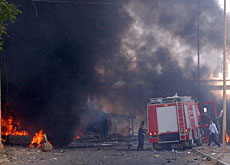
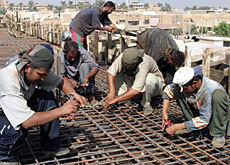
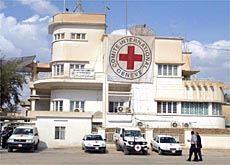
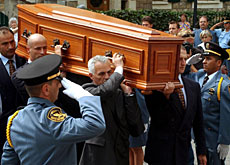
You can find an overview of ongoing debates with our journalists here. Please join us!
If you want to start a conversation about a topic raised in this article or want to report factual errors, email us at english@swissinfo.ch.